

Supermarkets in Norway. Seeing as eating out in Norway can be far more expensive than in other parts of Europe and the world, the supermarket can be a good source for more reasonably priced foods.
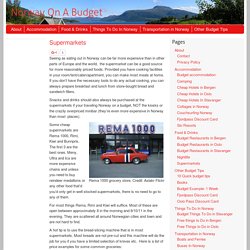
Provided you have cooking facilities in your room/tent/cabin/apartment, you can make most meals at home. If you don’t have the necessary tools to do any actual cooking, you can always prepare breakfast and lunch from store-bought bread and sandwich fillers. Snacks and drinks should also always be purchased at the supermarkets if your traveling Norway on a budget, NOT the kiosks or the crazily overpriced minibar (they’re even more expensive in Norway than most places).
Rema 1000 grocery store, Credit: Aslakr Flickr Some cheap supermarkets are Rema 1000, Rimi, Kiwi and Bunnpris. For most things Rema, Rimi and Kiwi will suffice. A hot tip is to use the bread-slicing machine that is in most supermarkets. 1 liter of milk: around 15 NOK A loaf of bread: Between 15 and 35 depending on what quality you want. A Step By Step Guide to Recycling Your Bottles in Germany. When you are a solo expat trying to navigate life in Germany by yourself even the simplest tasks seem overwhelming and difficult especially when they are nothing like what you do ‘back home’.
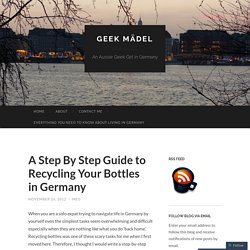
Recycling bottles was one of these scary tasks for me when I first moved here. Therefore, I thought I would write a step-by-step guide for all you new solo expats to take the fear out of recycling your bottles for the first time. 1. When you are about to head out to the supermarket to do your weekly shopping gather up all the empty plastic and glass bottles and soft drink cans you have brought throughout the week and kept waiting to recycle them. It doesn’t matter where in Germany you have brought your bottle or can, they can all be recycled at your local supermarket. 2. 3. 4. 5. 6. Like this: Like Loading...
Garment collecting. Of the thousands of tonnes of textiles thrown away every year, 95% could be re-worn or recycled.
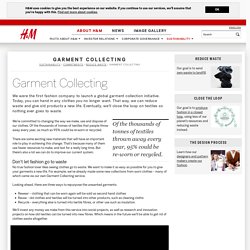
We’re committed to changing the way we make, use and dispose of our clothes. Ireland's Leading Textile Recycling Company -Collection Bank Services - Fundraising - School Collection Schemes - All-Tex Recyclers Ltd. What happens to the items of clothing, household textiles and paired shoes after All-Tex Recyclers collect them?
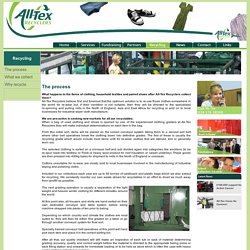
All-Tex Recyclers believe first and foremost that the optimum solution is to re-use those clothes somewhere in the world for re-wear but, if their condition is not suitable, then they will be directed to the specialised re-spinning and pulling mills in the North of England, Asia and East Africa for recycling or sold on to local businesses for industrial wiper cloth manufacture. We are pro-active in seeking new markets for all our recyclables. When a bag of used clothing and shoes is opened by one of the experienced clothing graders at All-Tex Recyclers they will make individual determinations on each item in the bag. From this initial sort, items will be placed on the correct conveyor system taking them to a second sort belt where other belt operatives break the clothing down into definitive grades.
If you would like to find out more please contact us. UK recycling industry has potential to create 10,000 new jobs, report finds. Pursuing recycling and more efficient resource use could lead to a UK industry with net exports of more than £20bn and 10,000 new jobs in the recycling sector by 2020, according to a new report.
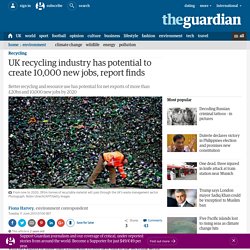
Businesses outside the sector could also reduce their costs by £50bn a year on savings in raw materials and energy, says the report, Going for Growth, published on Tuesday by the Environmental Services Association (ESA) and the government-funded Waste and Resources Action Programme (Wrap). If activities such as the research and development of new design techniques, that would minimise the need for recycling, and better ways to reuse materials are included, the opportunity could be for 50,000 new jobs and a £3bn boost to the UK's annual GDP. The findings reflect the potential opened up by a "circular economy" – one in which used material is not regarded as waste but as a resource, to be reused first, as that is the most efficient option, then recycled as necessary. World waste and recycling market worth $410billion « Recycling « Waste Management World.
IKEA and Reverse Vending Corporation are Electrical and Electronic Equipment Recycler of the Year 2012 Finalist in this year’s National Recycling Awards 2012. Electrical and Electronic Equipment Recycler of the Year 2012 Finalist IKEA and Reverse Vending Corporation are delighted to announce that we have been shortlisted in this year’s National Recycling Awards 2012.
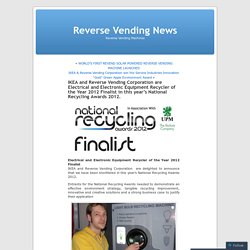
Entrants for the National Recycling Awards needed to demonstrate an effective environment strategy, tangible recycling improvement, innovative and creative solutions and a strong business case to justify their application Electrical and Electronic Equipment Recycler of the Year 2012 Finalist To help improve the global environment through recycling, RVC developed the reVend® light bulb reverse vending recycling machine utilising proven existing reverse vending recycling platforms with new unique technologies added. The reVend recycling machine is the FIRST Light Bulb Reverse Vending Recycling machine in the World. The reVend Light Bulb Recycling Reverse Vending machine accepts ALL Domestic Light Bulbs. Visit the National Recycling Awards 2012 website >> Office Recycling Storage. EU waste legislation - Environment. Cookies This site uses cookies to offer you a better browsing experience.
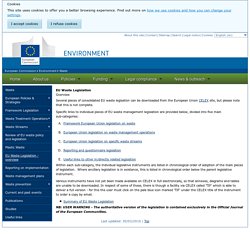
Find out more on how we use cookies and how you can change your settings. European CommissionEnvironment Accessibility tools Go to content Service tools Language selector Current language: English (en) Navigation path High level navigation Page navigation Additional tools EU Waste Legislation Overview Several pieces of consolidated EU waste legisation can be downloaded from the European Union CELEX site, but please note that this is not complete. Specific links to individual pieces of EU waste management legislation are provided below, divided into five main sub-categories: Within each sub-category, the individual legislative instruments are listed in chronological order of adoption of the main pieces of legislation.
Statistics Notice1. EU waste legislation - Environment. UK councils could be required to recycle 70% of waste by 2030. Councils will have to recycle 70% of household waste by the end of the next decade, under proposals unveiled on Wednesday by the European commission.
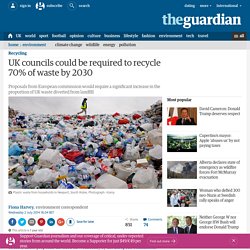
This would require a significant increase in the proportion of UK waste diverted from landfill. At least 80% of packaging waste will also have to be recycled by 2030, as Brussels toughens its stance on the amount of rubbish buried underground. By 2025, there would be a total ban on sending waste to landfill that could have been recycled.
The new targets will be difficult for the UK to meet, as recycling rates have recently stagnated after a period of rapid growth in the past decade. Waste and recycling.